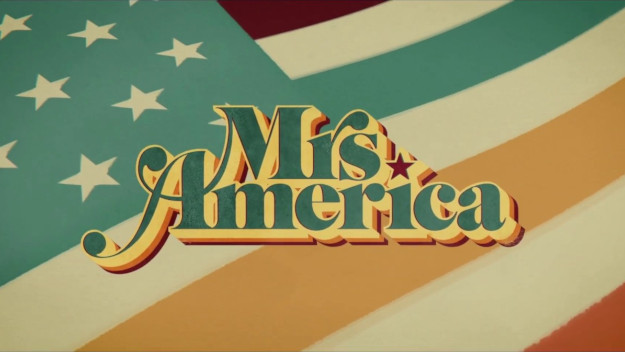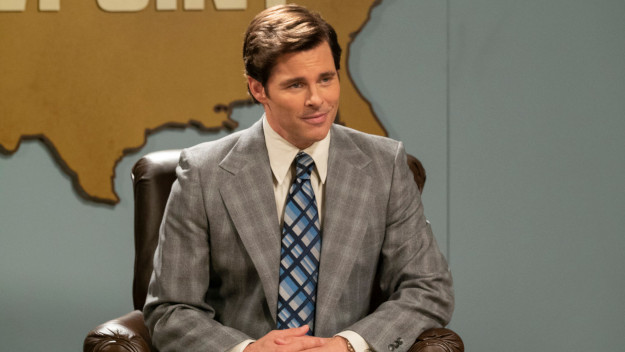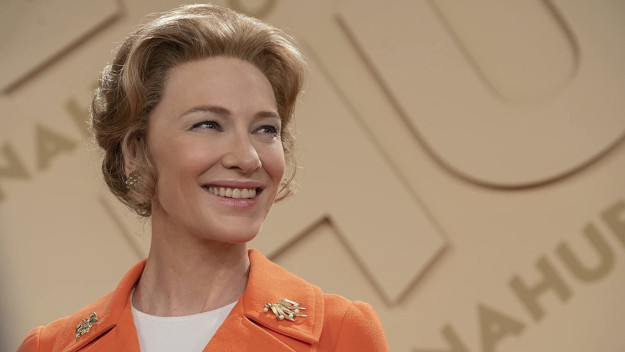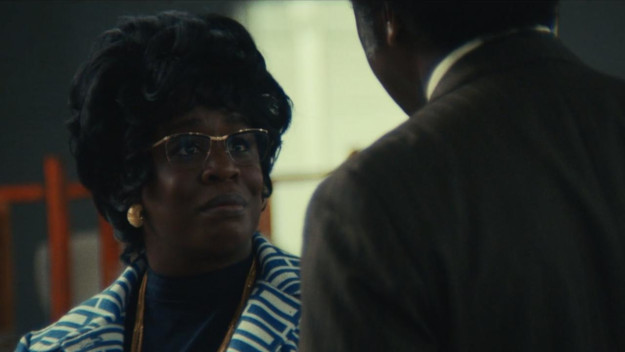
Here we go!
Edit (5/15/2020): With the release of Part 2, the presentation of sources in this article have been standardized to match that one.
Under normal circumstances, I’d cringe away from a show like Mrs. America. When I first heard of it, I knew that the show would be another one of many chronicles of the highly partisan shit show that we now know as the Culture Wars. Although I love to pick apart stories and see what makes them tick, it seemed like a bit too much to handle at first glance.
Then again, we don’t live in normal times, so I watched it anyway.
Long story short, it’s a good-to-great show, but not for the reasons you think. Let’s do a deep dive!
Episode 1 – Phyllis The Moonbat.

James Marsden deserves more.
Before we get into the meat of the story, it’s important to recognize that the show often splits its attention between Phyllis Schlafly (Cate Blanchett) and several prominent feminists and political activists. While this helps to give the show a decent sense of balance, it’s quite clear that Blanchett is the star of the show, and she plays the head of the conservative women’s movement to near perfection.
It’s just a shame that the writing injects a ton of fiction into the historical record. I’ll do my best to document that as we go.
Our story begins in 1971 at a fundraiser for Republican Congressman Phil Crane (James Marsden). As one can soon see, Phyllis and the some of the women there are putting on a swimsuit show for the audience. I’m not quite sure if this particular event actually happened in real life, but it serves as a reasonably plausible way for Phyllis to claw her way back into the political arena after two failed congressional runs.
Sure enough, she uses the opportunity to score a spot on Phil Crane’s talk show, which was called Conservative Viewpoint. One might ask how a congressman found the time to host a television show, but it’s not that far fetched when one considers that Ted Cruz has a podcast and AOC recently appeared on Ru Paul’s Drag Race.
Anyway, Phyllis manages to skate past Crane’s oddly horndog-ish attitude and scores herself a meeting… with Senator Barry Goldwater. Soon after that, her friends at the hair salon alert her that the Equal Rights Amendment is on the verge of sailing through Congress, but our anti-heroine seems to think nothing of it until she meets with the aforementioned Senator.
After an eye-rollingly corny point where Senator Goldwater and the gang ask her to take notes about SALT II, we are exposed to several of the baffling contradictions that are woven throughout this story. In this particular instance, Phyllis claims to be in favor of equal pay laws and other things like that, but she doesn’t think that the ERA is a good idea for some reason.
Once Phyllis gets home, she has to deal with some tension because no one appears to want to marry her sister, Eleanor (Jeanne Tripplehorn). Of course, Mrs. Schlafly does her best to reassure her sibling, and I think that the scene does a good job of illustrating a very real fear. More on that later!
Oh, by the way, there’s also quite a bit of marital tension between Phyllis and Fred (John Slattery), which culminates in what is supposedly thought of as a rape scene. I know that Anne Schlafly Cori has denied that there was any serious strife in the house, but the far more subtle nature of the scene points to Phyllis’ belief that married people automatically consent to sex. Therefore, it’s more than possible to split the difference.
At the end of it all, we’re introduced to the two distinct plotlines that make up the rest of the story. On one side, Phyllis gives a speech to a bunch of conservative women, denouncing the ERA, equal responsibilities, and the idea that men could honestly like being around their kids. On the other, Gloria Steinem (Rose Byrne) and a variety of feminists write her off as a far-right hack.
They’re going to regret that, aren’t they?
Episode 2 – CAT FIGHT!

Cate Blanchett will probably get an Emmy and a Golden Globe for this, but…
“Gloria” primarily serves as a set-up point for the pro-ERA side of the political column, which is especially relevant because of the approach of the 1972 U.S. Presidential Election. But in all honesty, it should have been called Friedan (Tracey Ullman) vs. Steinem, partly because the unspoken division between the two feminists takes up a chunk of the episode’s run time.
We open in 1972 during the launch party for Ms. Magazine, a publication that still exists to this day. On some level, one can see the glamour of Gloria’s early fame, but several recappers of this show have pointed out that she represents an unmarried, childless existence that the Schlaflys of the world are afraid of. This may sound nice at first glance, but one can ultimately blow a giant hole in feminism by asking a simple question: Why would anyone fear a person who has no real legacy or connection to the future of the planet?
Speaking of a moment of cringe, we’re also treated to a glossed-over statement from Flo Kennedy (Niecy Nash), who wonders why Andy Warhol seems distant and won’t talk to her. Oh, she represented the woman who shot him. Go figure.
And of course, it’s not long before we’re introduced to ANOTHER silly statement about how abortion would be a sacrament if men could get pregnant, but I have a feeling that the final episode will debunk that one on its own. Oh, Gloria also has to deal with an ad guy who is hitting on her. Let’s just throw that in for good measure.
After the party and a lazy meditation on how women should be a monolith even though they’re not, we learn that Gloria is trying to wrangle Senator George McGovern (John Bourgeois) into supporting some kind of abortion measure at the Democratic Convention. When she meets with the Senator, she plays a strategy card by pointing out that reproductive freedom works better and can also apply to men’s worries about issues like sterilization. That stopped-clock moment is not horrible, but it’s outweighed by even more cringe-worthy nonsense on the Phyllis side of the story.
Speaking of which, Phyllis finds herself exploiting the Fairness Doctrine in order to get the Stop ERA campaign on Donahue, which is incredibly ironic when one considers the later conservative efforts to kill that same doctrine. The writing team uses her time on the show to point out that many political figures find it perfectly reasonable to ignore the truth, which is a good lesson that we all need to learn.
Unfortunately, the show conveniently ignores this when we get to Phyllis’ first big protest in Springfield, Illinois. At that point, Gloria Steinem lays it on thick with a voiceover about how conservative women are brainwashed to believe that they’ll lose the protection and love of men if they don’t play the game.
I reject the notion that civilization is a game, but let’s put our thinking caps on for a moment. Among many other things, the feminist rhetoric that these women pioneered is steeped in the idea that men, capitalism, heterosexuality, and other WTFs are brutish oppressors that need to be overthrown. When faced with a choice between that kind of socialist nonsense and a woman who rejects that, why would any man with half a brain pick a feminist for any kind of serious relationship?
By the way, this particular point of discussion will get WAY funnier when we reach Episode 5. Be sure to stick around for that one!
Anyway, Phyllis succeeds in Illinois, delivering the first significant blow to the ERA.
Oh, it’s going to go downhill from here.
Episode 3 – Shirley’s Anti-Historical Variety Hour!

Shirley Chisholm paved the way for President Obama and Secretary Clinton, but that doesn’t mean that the writers can get away with a total fabrication.
At first glance, “Shirley” might seem like an interesting episode because it largely focuses on Rep. Shirley Chisholm (Uzo Aduba) and the inner workings of the 1972 Democratic Convention. However, I started to notice that several of the characters were acting as if they were mouthpieces for the writers, which set off alarm bells in my head. Naturally, I felt compelled to dig into the real history behind Shirley’s campaign and what actually happened in Miami Beach.
Long story short, much of this episode’s story is complete and total bullshit.
As I pointed out above, the story opens in July of 1972. Down in Miami Beach, Gloria and many of the feminists are at the Democratic Convention to support their candidates. The show mentions that Senator McGovern, Vice President Humphrey, Senator Edmund Muskie, and Senator Henry “Scoop” Jackson are all there, but it doesn’t tell us anything about the actual state of the race.
Instead, we mostly focus on the episode’s title character, and it’s not long before we’re treated to screeds of “WHITE MAN BAD.” Apparently, Shirley’s campaign is in dire straits. She knows that she wants to get 100 delegates to make a deal, so she gives a speech that seems to fire up the base. Needless to say, Bella Abzug (Margo Martindale) isn’t having it. She calls out Shirley’s endorsement by the Black Panthers, accuses her of going on an ego trip, and states that they cannot afford to alienate men.
That last idea died with Elvis on the crapper, didn’t it?
Out here in reality, Shirley was in no position to negotiate anything. She had very little popular support going into the convention, but she managed to get 152 delegates primarily because of Vice President Humphrey. According to The New York Times, he released his 93 black delegates and encouraged them to vote for Chisholm, but that was after the campaign to stop McGovern failed (Source/Archive).
There’s also a C-Plot that involves Gloria Steinem as she attempts to make a deal with McGovern on reproductive rights, but this part is largely bullshit, too. According to Shirley MacLaine herself, Gloria’s resolution actually passed the Platform Committee, but the entire thing turned into a giant clusterfuck and didn’t appear in the platform report (Source/Archive).
Jennifer Wilke was actually responsible for the minority resolution. However, her efforts were derailed when a Missouri delegate by the name of Eugene Walsh spoke out against abortion, which motivated George Wallace and Hubert Humphrey’s team to try to force a “Yes” vote. At that point, McGovern was forced to intervene, which compelled Gloria’s breakdown.
In a strange departure, the episode doesn’t really focus on Phyllis all that much, but it does deliver some interesting tidbits that awkwardly smooth over her proto-Alt-Right image. Sure, the show does point out that the STOP in STOP ERA stands for “Stop Taking Our Privileges,” but it also plays around with the idea that Phyllis seems to be only mildly miffed at the need to balance normal tradcons like Alice (Sarah Paulson) with flaming racists like Mary Frances (Melinda Page Hamilton). On some level, this seems like something that she would do, but it’s important to note that her associations would’ve led her to side with the flaming racists.
More on that in the next part!
No Comments Yet